Our Story
Closet, crisis and conscience: the untold journey of LGBTQ+ doctors and dentists

LGBT+ History Month has been marked in the UK for two decades and the theme in 2024 was Medicine and Healthcare. To celebrate, we delved back into the archives of GLADD to explore almost 50 years of previously untold LGBTQ+ history.
The words of philosopher George Santayana “those who cannot remember the past are condemned to repeat it” are, not least for the LGBTQ+ community, as pertinent today as when he wrote them in 1905. Queer history can be hard to study as there are few public records, so we are often reliant on private papers and memory. At GLADD we are lucky to have an archive of material and the opportunity to hear from those pioneers who fought to organise LGBTQ+ medical & dental professionals. It is a rich and complex history tied up in radical politics, seismic social changes and determined individuals, without whom we would not be able to live the professional or personal lives we do today.
There are multiple predecessors to GLADD, organisations that have over time been chameleons responding to need, pressure and circumstance, but with consistent core values. Our history begins with the Gay Medics and Dentals Society founded by Martin Hamilton-Farrell at the University of London Union in 1975. It was a brave step. Gay and lesbian politics in the 1970s were a conflict of radicals and moderates, differing expressions of culture and complex political affiliations. Martin expected hostility and prejudice when he applied for Union funding but the society was approved with a start-up grant of £250 surprisingly easily, perhaps because the committee was exhausted at the end of a difficult meeting.
The society was characterised by a juxtaposition of open campaigning and secret membership. It participated under its own banner in gay rights marches and ran a poster and leaflet campaign in medical schools with the message ‘you are not alone’. The posters were regularly defaced or destroyed. Robert George fondly recalls members ‘zapping’ hostile medical and related organisations by attending meetings and declaring their sexuality. Questionnaires and then information packs were sent to consultants in Psychiatry, Obstetrics & Gynaecology and Sexual Health, testing and informing their understanding of homosexuality. A pamphlet detailing counselling facilities for homosexual people in distress was distributed to many GPs and hospital doctors across London. In contrast, correspondence was through a student union post box and the list of around 150 members was kept confidential. Many were not yet out and others feared their involvement would prove career-limiting. There was opposition, including from the Gay Liberation Front who shunned the medics as being elitist, but Martin and his colleagues found it exciting, conspiratorial and ‘totally worth it’. Sadly, there was no natural successor to run the society after Martin graduated and, under the pressure of house officer rotas, the society was closed in 1977 and membership list destroyed.

Poster for the Gay Medics and Dentals Society

Pamphlet distributed across London in 1977

Martin's 1980 letter to the BMJ

Letter from the editor of the BDJ, 1985
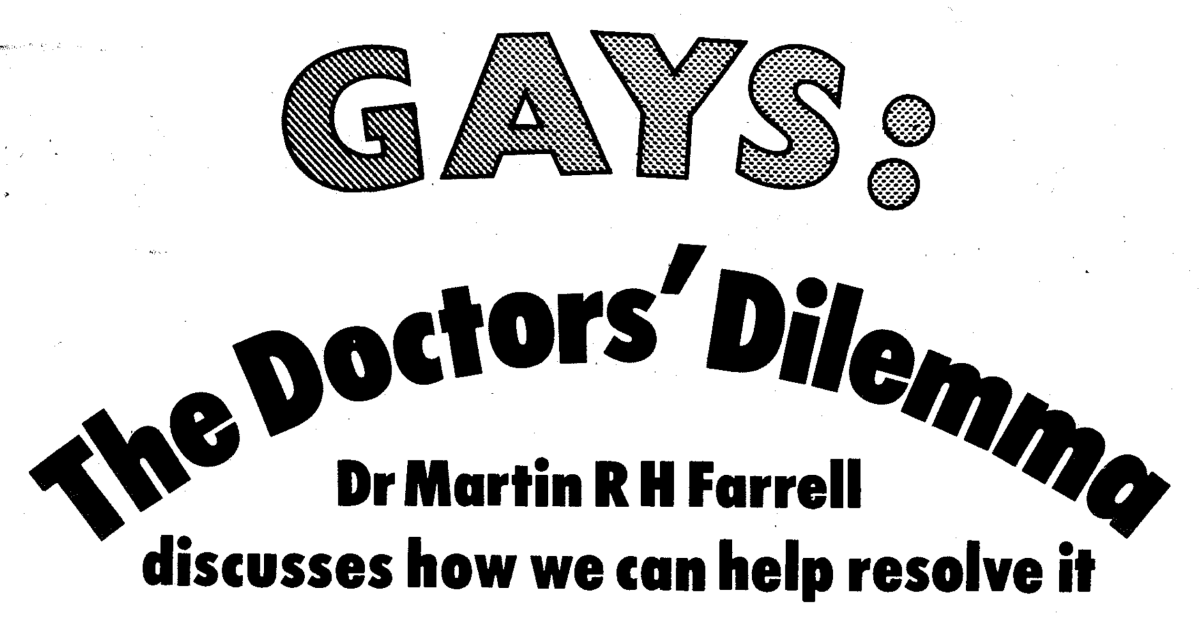

Newspaper headlines
1983 information leaflet on AIDS
In 1980 the BMJ refused to publish an advert for a group of homosexual doctors in Edinburgh on the basis that it would cause offence to most readers. The BDJ would also adopt the same stance. In the same year Martin formed the Gay Medical Information Society with David Harvey, which evolved into the Gay Medical Association (GMA) 18 months later. Colin Brewer remembers meetings as being informal social events with discussion of medical papers and (sometimes moderate) drinking. Some members met their future partners at meetings. There were proposals to admit allied health professionals and a compromise associate membership was created to cater for these. Tensions existed between those who viewed it as an extension of parties and dining clubs and others who wanted a platform for activism. The group was part of successful campaigning to declassify homosexuality as a mental disorder in the ICD-10.
The arrival of HIV/AIDS focussed the GMA on educating the community and they produced the first pocket-sized information leaflet for gay men in Britain. Unfortunately, there was only one print run, as the printer also produced pornography and everything was confiscated in a police raid. Attempts to work through the Health Education Council were rebuffed as, distressingly, it did not wish to become involved. GMA members were also involved in the Terence Higgins Trust and worked with them and London Gay Switchboard to organise a public conference on HIV/AIDS at Conway Hall in 1983, the first of its kind in Britain. Many members were working in HIV research and treatment but the GMA lacked the financial, legal or political resources for effective partnership.
By 1986, however, it was able to co-host the first international conference on Homosexuality and Medicine at the Royal Society of Medicine with the American Association of Physicians for Human Rights, largely through contacts made by Colin Brewer. This conference raised the profile of the GMA and when a new lobbying group called Stonewall was proposed, chair Peter Rivas became a founding member. Treasurer Richard Copeman recalls that GMA funds were used to help establish Stonewall and, as a friend of a member, Sir Ian McKellen was guest of honour at a GMA annual dinner.
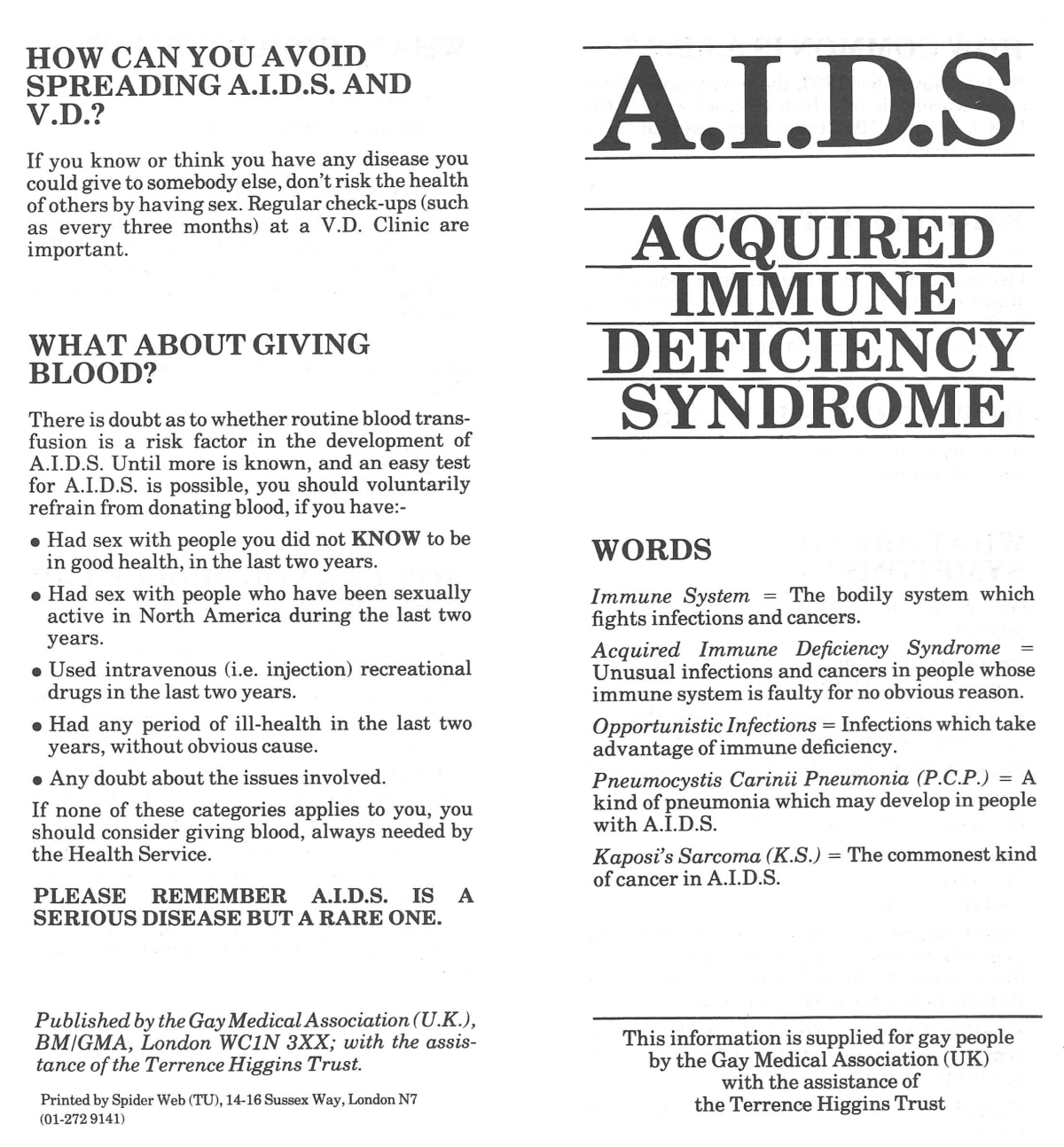
GMA AIDS leaflet
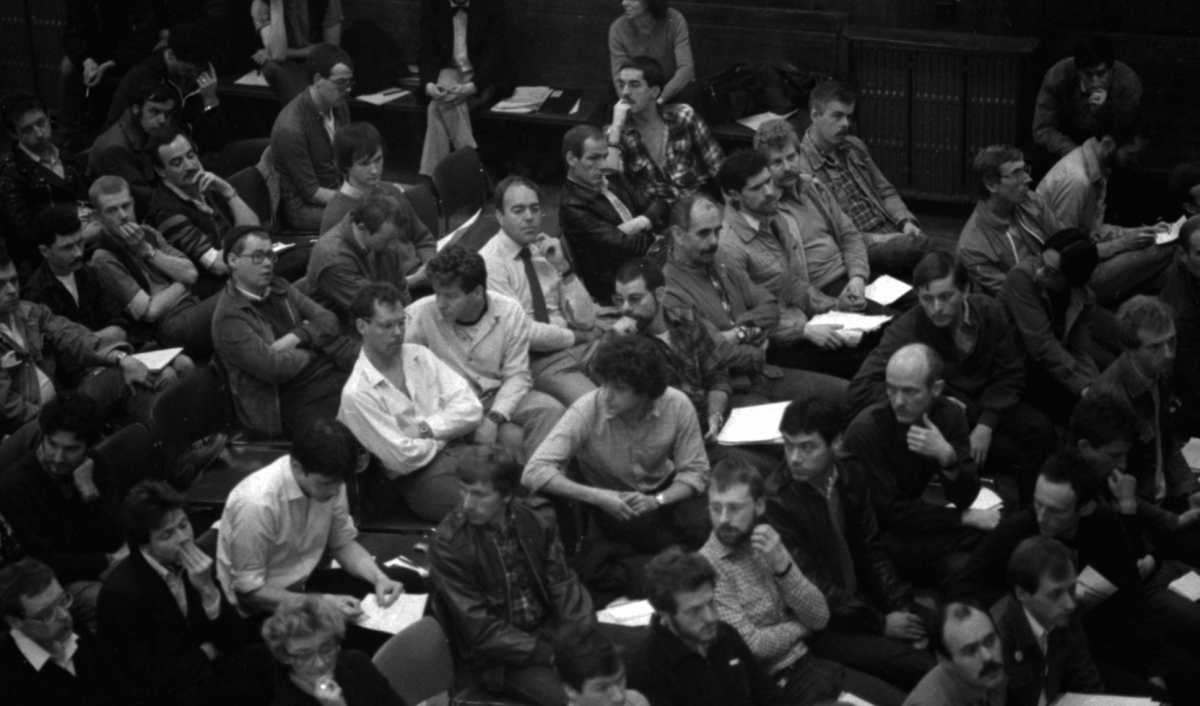
Conway Hall meeting 1983


International Conference 1986
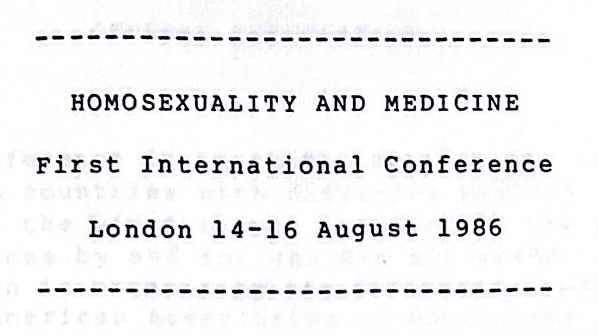
Conference programme
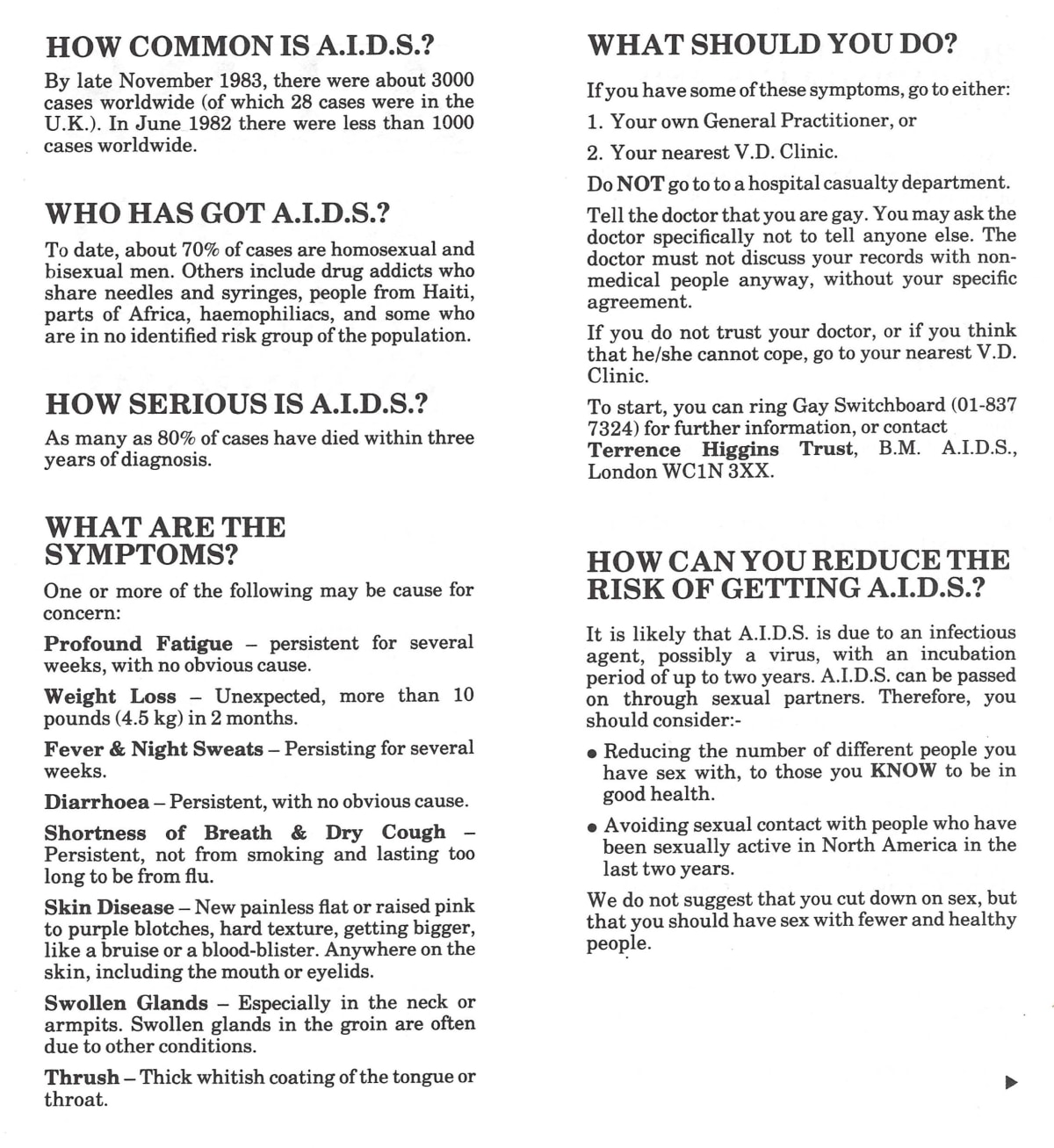
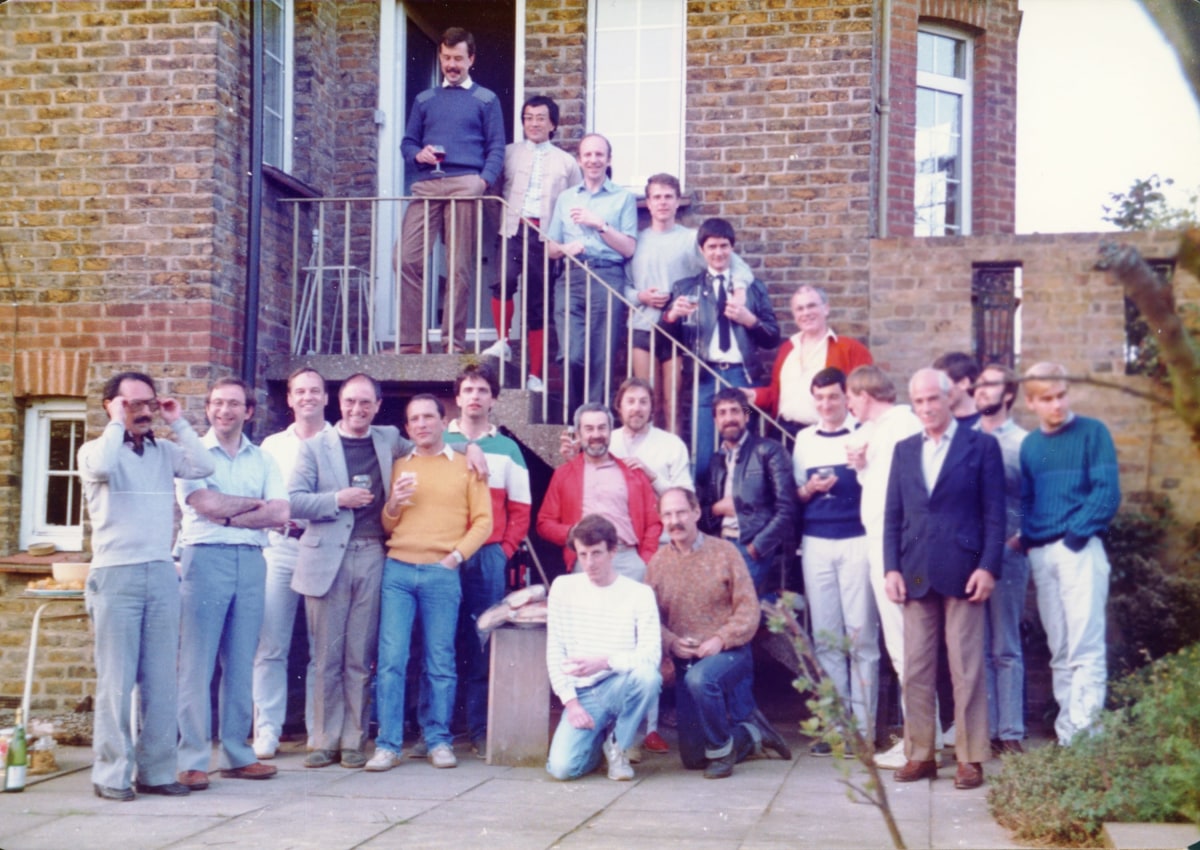
GMA garden party c.1983


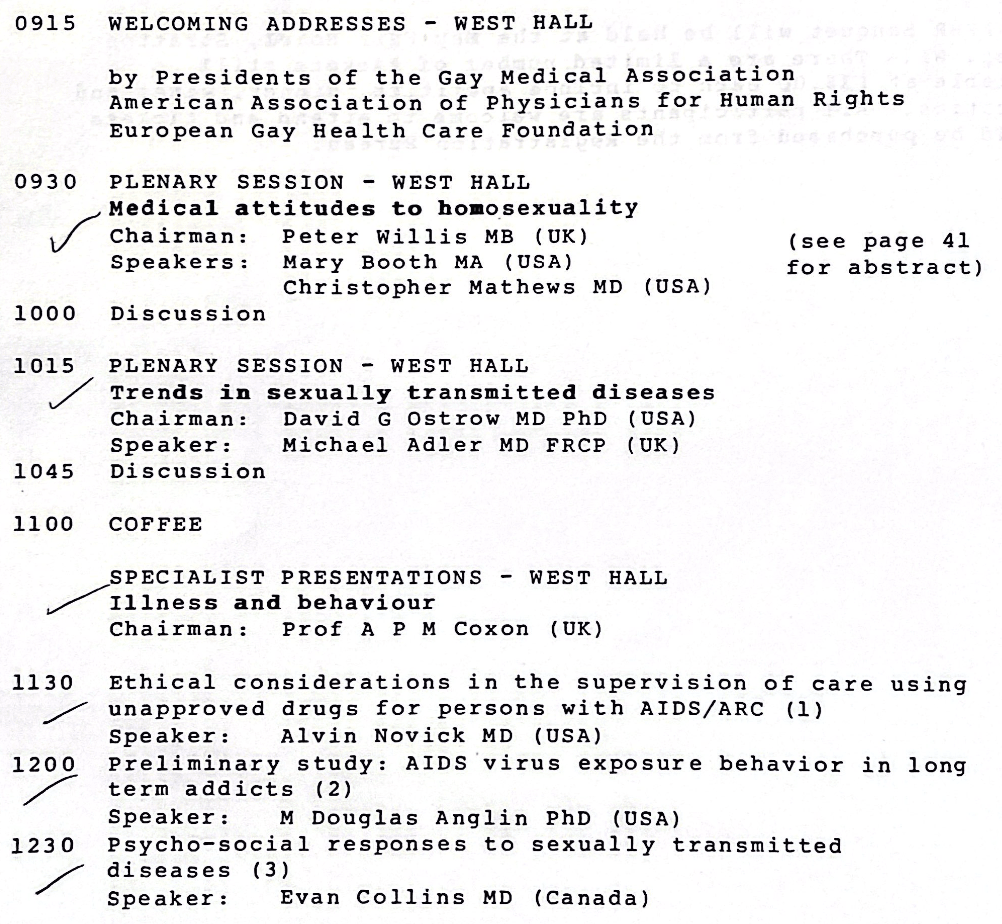
Although the GMA had and welcomed female members it was seen as male dominated. Consequently Susan Bewley co-founded Women In Medicine in the early 1980s as a radical counterpart to the Medical Women’s Federation, and many gravitated there. This was a time when rape was legal within marriage and lesbians automatically lost custody of their children.
In 1985 when Catherine Meads found she could not reconcile being a doctor and a lesbian, she temporarily left medicine to lead the Lincoln Gay Group and Switchboard. The local public health department refused to act over the HIV/AIDS crisis so the group stepped in, distributed leaflets, and ran phone-ins for isolated people desperate to talk. Their activities were often challenged; on organising a ‘How To Be A Happy Homosexual’ stall at the Lincoln Cares Exhibition, the local authority threatened to pull funding unless they were evicted. With the help of the cathedral, Catherine prevailed only to have the stall wrecked by a fundamentalist Christian group.
GLADD formed in 1994 and was formally constituted in 1995. It was a new organisation but many founding members had participated in the earlier groups and GMA funds were transferred in. There was a desire for a fresher and more inclusive approach, reflected in the name including lesbians and dentists, and the appointment of Susan Bewley and David Harvey as co-chairs. The declared intent was to make news at the front of the BMJ rather than advertise in the back, something we are proud to continue to this day. Meetings followed the pattern of lectures and a buffet, although there were still parties. Jolyon Oxley remembers Professor Sir Graeme Catto, then president of the GMC, attending one such meeting when the GMC accepted GLADD’s guidelines on equality & diversity in the workplace. In 2020 GLADD’s name was broadened to LGBTQ+ doctors and dentists, and the contributions of David Harvey & Peter King have been memorialised in our annual prize & lecture.
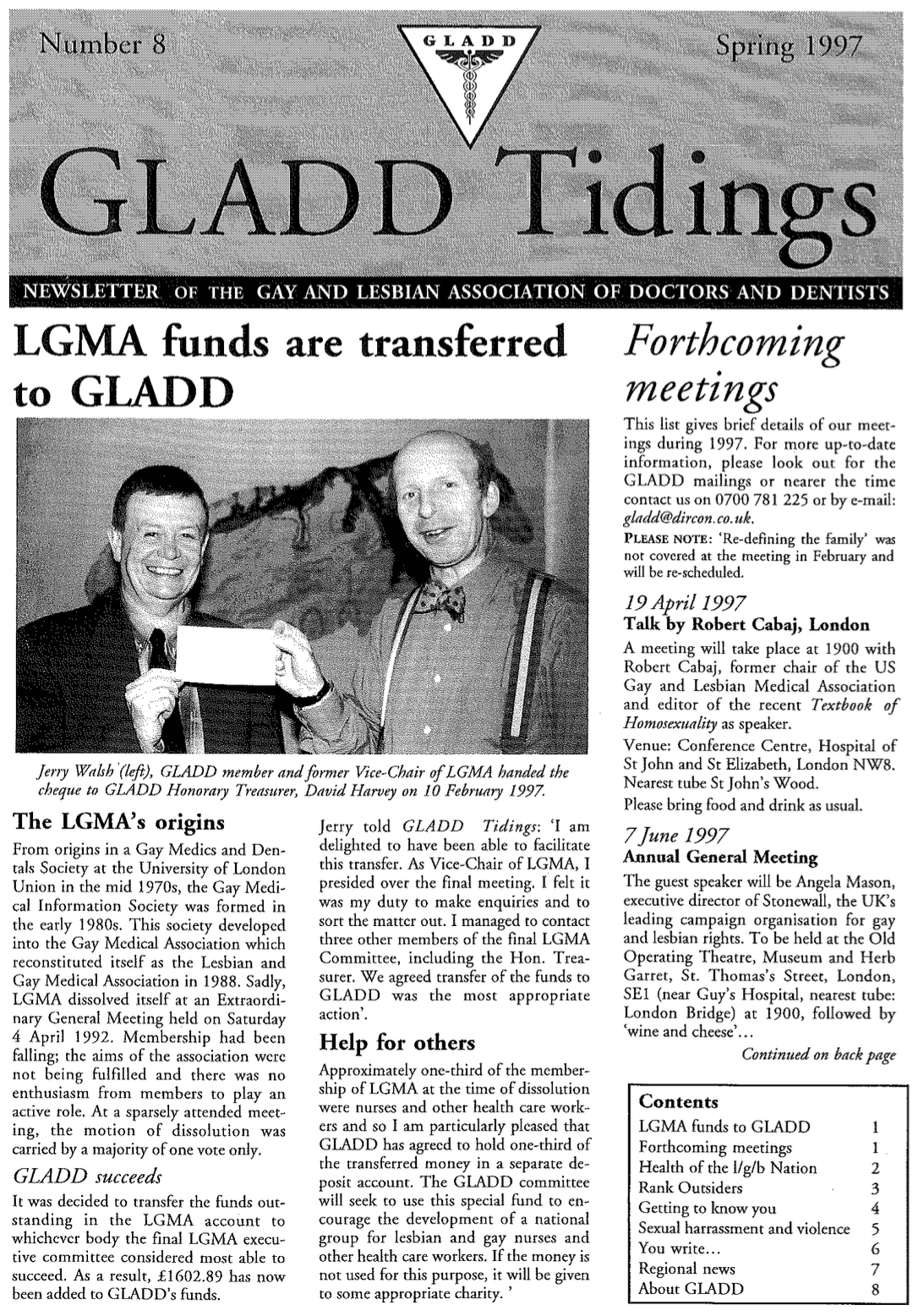
Tidings newsletter 1997

Student poster 2000
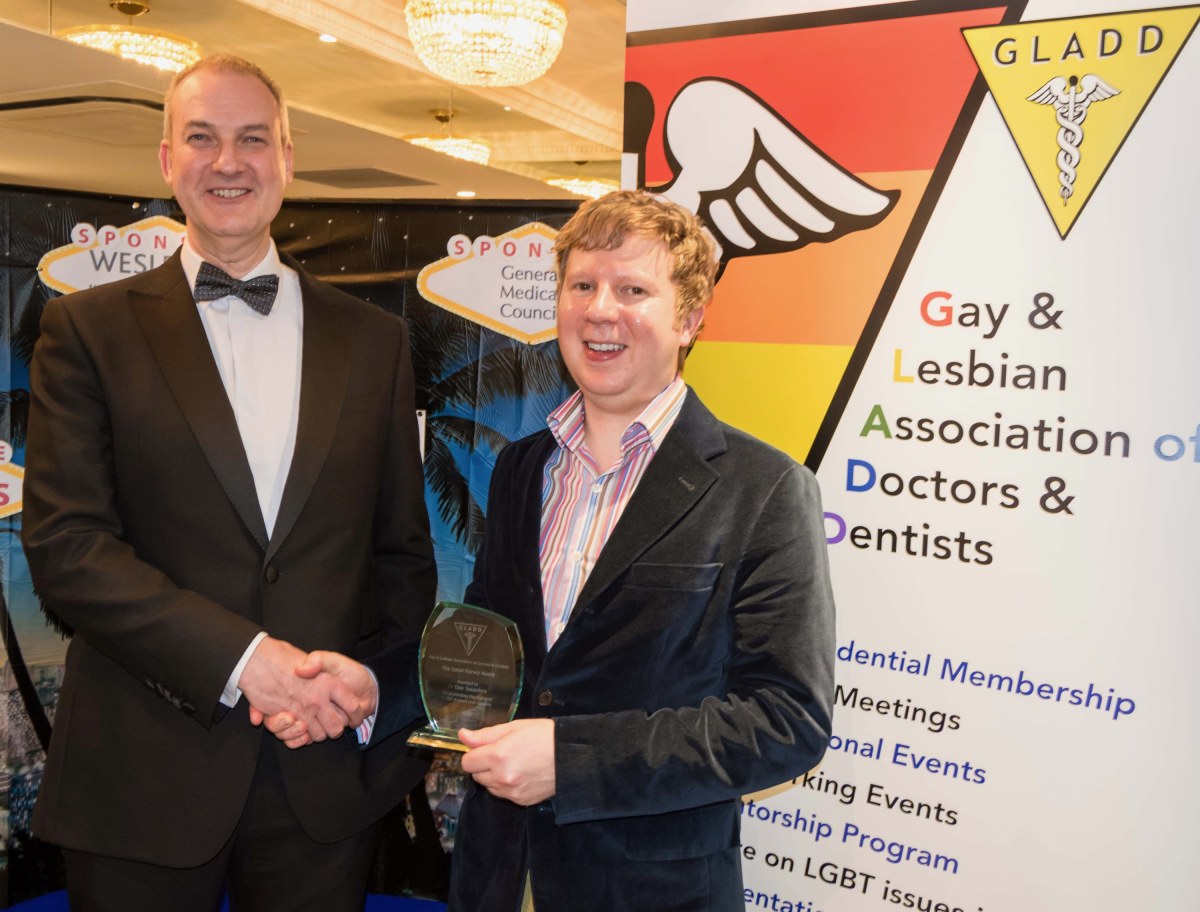
Daniel Saunders presented with 2015 David Harvey Award

Display at the GLADD 20th anniversary AGM, 2015
Understanding where we have come from helps us to know where to go next. Many contributors have commented on how the past feels like a foreign country, so different were attitudes then. The public’s outlook has broadened and our profession has evolved, but it can still be hard to come out. As highlighted in our 2022 report with the BMA there is still prejudice and inequality in the NHS. GLADD’s education and activism work continues through our involvement with the BMA and GMC equality, diversity & inclusion committees and initiatives like the Medical Schools Charter on so-called ‘conversion therapy’. Our mentoring programme and university connections are designed to engage and support the next generations of LGBTQ+ medics and dentists.
There is so much more to explore from those formative years. In 2025, GLADD’s 30th year and the 50th anniversary of the Gay Medics and Dentals Society, we launched our Heritage Project with support from The National Lottery Heritage Fund. The project will further explore, preserve and share stories through oral histories, archive development and a podcast series through to 2027. We would love to hear from anyone who would like to contribute and share their story.
GLADD wishes to thank the following for their contributions, without which it would not have been possible to share this history:
Susan Bewley
Colin Brewer
Richard Copeman
Robert George
Martin Hamilton-Farrell
Catherine Meads
Jolyon Oxley
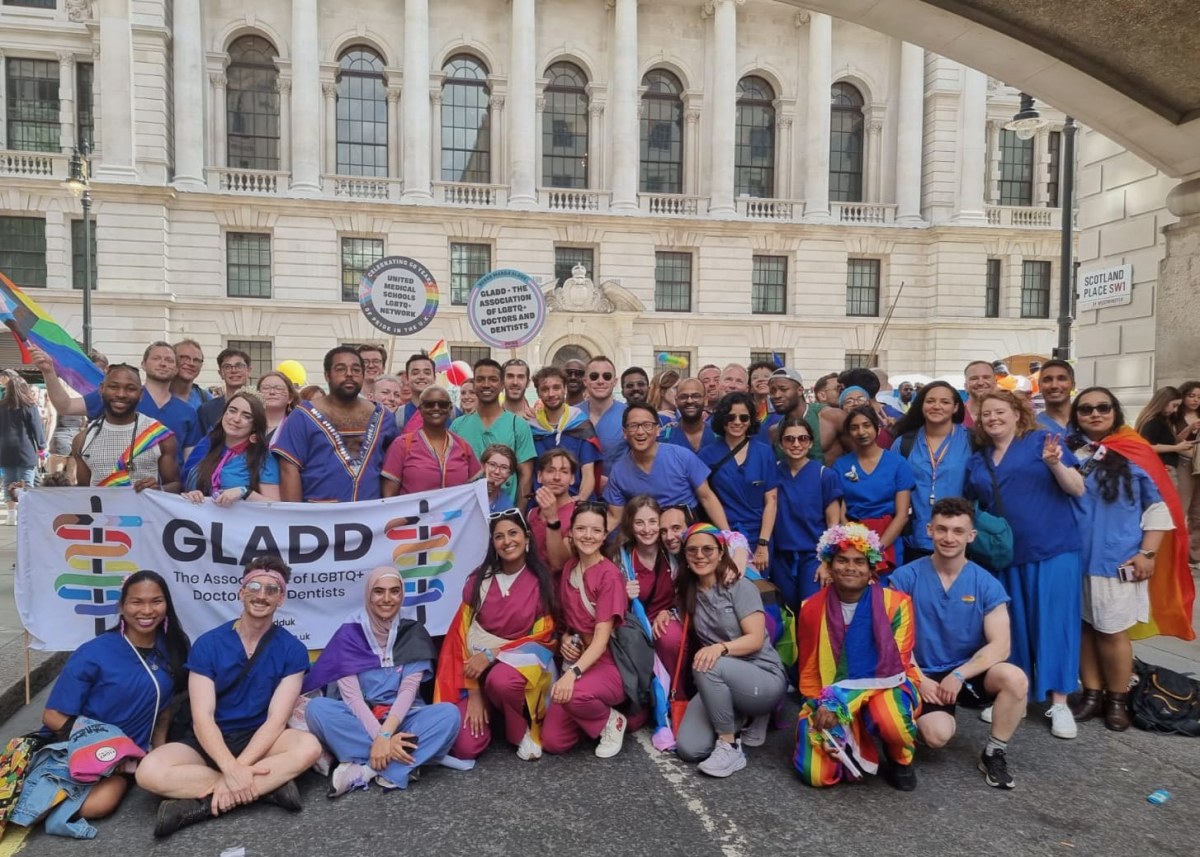
GLADD at London Pride 2023